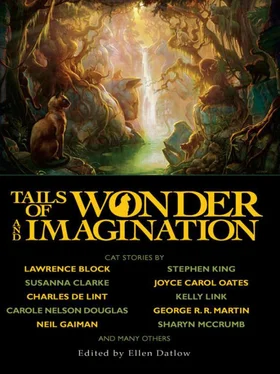Ellen Datlow - Tails of Wonder and Imagination
Здесь есть возможность читать онлайн «Ellen Datlow - Tails of Wonder and Imagination» весь текст электронной книги совершенно бесплатно (целиком полную версию без сокращений). В некоторых случаях можно слушать аудио, скачать через торрент в формате fb2 и присутствует краткое содержание. Год выпуска: 2010, ISBN: 2010, Издательство: Night Shade Books, Жанр: Фэнтези, Фантастика и фэнтези, Ужасы и Мистика, на английском языке. Описание произведения, (предисловие) а так же отзывы посетителей доступны на портале библиотеки ЛибКат.
- Название:Tails of Wonder and Imagination
- Автор:
- Издательство:Night Shade Books
- Жанр:
- Год:2010
- ISBN:978-1-59780-170-6
- Рейтинг книги:5 / 5. Голосов: 1
-
Избранное:Добавить в избранное
- Отзывы:
-
Ваша оценка:
- 100
- 1
- 2
- 3
- 4
- 5
Tails of Wonder and Imagination: краткое содержание, описание и аннотация
Предлагаем к чтению аннотацию, описание, краткое содержание или предисловие (зависит от того, что написал сам автор книги «Tails of Wonder and Imagination»). Если вы не нашли необходимую информацию о книге — напишите в комментариях, мы постараемся отыскать её.
collects the best of the last thirty years of science fiction and fantasy stories about cats from an all-star list of contributors.
Tails of Wonder and Imagination — читать онлайн бесплатно полную книгу (весь текст) целиком
Ниже представлен текст книги, разбитый по страницам. Система сохранения места последней прочитанной страницы, позволяет с удобством читать онлайн бесплатно книгу «Tails of Wonder and Imagination», без необходимости каждый раз заново искать на чём Вы остановились. Поставьте закладку, и сможете в любой момент перейти на страницу, на которой закончили чтение.
Интервал:
Закладка:
“What do I say, Old Foss?” said the Old Man, never turning his eyes from them.
“They are like what should be over the horizon,” Old Foss said, “or a poem dreamed but left unfinished; they are desire and loss. Say no. Say no now and turn and run and do not look back.”
“Why not go?” the Old Man said. “I wish to, with all my art, my heart, my feet, to go with them.”
“Ah,” Old Foss said, “but a sieve will only sink and bring you certainly to a place you cannot know now, but death has been visited by others before and will be again and is common enough that we can wait until it finds us without looking for it. I think there are no dreams there.”
And the Old Man turned his head to look at Old Foss, then, and it was enough that first time to save him. For Old Foss yawned and was just a cat again. And the Jumblies were just the wind piling sand and unpiling it again back into the sea, a whisper that did not ask, will you come with us?
But when they came again only she came, the Jumbly Girl, in the night when he dreams, where Old Foss could not protect him.
Old Foss paused to wrinkle his nose for the rain he would have to endure. But he loved the Old Man, and the Old Man loved him; the Old Man had found him long ago when he was a lost kitten, and picked him up and took him in and fed him. Some debts, Old Foss reflected, are always still to be paid, no matter what we do.
He dropped to the floor and hurried to see if the front or back door has been left ajar, but no. The windows were all shut up tight for the storm. So it would have to be the hard way, to slip through a crack between here and there, to unravel the world for a moment as only cats know how to do.
I am too old for such things, Old Foss thought; too fat, he reflected, too comfortable, too tired, too selfish, too peevish, too everything.
Out of the world and back into the world again, but outside. No mean feat, Old Foss thought, even for a cat. He ran around the room, reaching out to catch at the frayed threads of the world where he could find them, pouncing, missing them as they seemed to curl around the corners of things into nothing; faster, he thought. He became wild-eyed with the pursuit, chasing the shadows of elsewhere across the hearth, up the wall, around turns that weren’t there. Soon, he was tearing as fast as he could around the room, panting with the exertion, until he disappeared.
Then he was there, like being under a rug, in a dark corridor with light poking through the frayed edges to show him where to go. He pushed through, his ears back, mewing with the work of it, until he felt, through one thin patch, the rain. It would have to do; he tore out, nearly running into a wall, running up it instead and stopping only when he reached the top—a red tile roof, wet and slick. He scrabbled for footing indecorously, caught himself, pulled himself upright and looked about, his eyes big, his heart pumping, the rain cold against his fur and already bringing forth a musty smell. He mewed forlornly with self-pity.
But Old Foss from his vantage saw the Old Man receding in the distance like a wave going out at low tide. No, Old Foss thought, no, he’s headed to sea.
Old Foss began to run, clattering over rooftops after the Old Man stepping so briskly to meet only death who waited, Old Foss knew, so patient and still below the unceasing heaving of the water.
Once before the Old Man had gone to sea in a sieve with his Jumbly Girl and her eyes of jade to match her skin and her smiles like sweet heartache in blue. Her touch against his cheek was a heart stopped, her voice in his ear a thought to fill immensity. They went indeed to visit with the sixty contending winds, who traded them wine for their baubles brought out of the world, giving a manna-sweet drink called Ring-Bo-Ree for little rings from the noses of pigs or unfinished paintings thrown discarded into the sea, or perhaps for the occasional runcible spoon. They sailed into the shifting thickness beyond the edge of things and were drawn into the sky by fiery birds and dreamed beside the islands of the sun and the night river. And—who knew?—sieves sink more slowly then one might suppose. At least sometimes, when the wind is right to hold them up, perhaps, or, perhaps when one moves too fast to notice one is sinking.
Old Foss had come after him, hiding in the rigging, or under the bundles to trade, watching and waiting.
And one day when the water of night came in too high and no one was left to bail it out and it was too late by far, Old Foss whispered in the Old Man’s ear as he dreamed: “Time to come home, for the water’s rising. Time to wake up, now or never. Time to dream a little less and live a little more, old friend,” and a partial payment on a debt never to be repaid was made.
“Thank you,” the Old Man said, when awake and in his bed again, “for surely I would have drowned.”
And yet, something was taken from the Old Man too, something taken that can never be returned—what the Jumbly Girl meant to him—and for that there was a new debt, never to be repaid.
“Why did you bother me,” the Old Man would say at other times, when the confusion came to him, “why didn’t you leave me to drown in peace, in bliss of other things, with my Jumbly Girl?”
For they had tried to keep him:
“Stay,” they had told him, despite the rising water, the leaking of the sieve. “Stay and dream with us.”
“Come with me,” he had said to his Jumbly Girl, “come with me and be my love; we will think of things to do to pass the time, though it will not be this—we will paint unfinished pictures by the shore and hold hands inside the rain. I will write you poems and you will tell bad jokes. It’s not this but isn’t it something?”
And she agreed to come with him, to meet him in the morning, by the shore of everything, below the sun, beside the night, where the sky birds came to draw them home by silver cords in their fiery beaks, on a raft made of fronds from the Twangum Tree; he and Old Foss waited for her to come from the sieve as it sank in the river of night, but she did not appear.
Somehow, it seemed, in stepping from the sieve to the shore to the raft, he had misplaced her; when he had turned back to hold out his hand and help her out, she was gone.
She never reappeared. And the Jumblies disappeared from the sieve with the morning light, like fog retreating into the sea, but with an ache like when you remember what you thought the world was going to be like when you were young and foolish.
“Come on, Old Man,” Old Foss had said, “the sieve is sinking fast.”
“Will I ever see her again?”
There is no answer to such questions and he offered none, but the Old Man asked it again, asked it so many times over the years that Old Foss finally said, “I’m sorry, Old Man.”
“Oh, I know, it’s all right, Old Foss.”
But it wasn’t.
Old Foss leapt from roof to roof like a young cat with nothing to lose, not a fat old cat with everything at stake. The rain had depressed him, then frustrated him, then made him ironic and bitterly elated. He sang: “How many lives, how many lives, how many more lives for the cat? At least one more, at least one more, and another one after that!” as he leapt across an alleyway and scrabbled onto the roof on the other side. When he reached the edge of town he climbed quickly, nosily, awkwardly down a drainpipe full with leaking water rushing. Leaping off the pipe, he landed badly, quickly looking around, licking his shoulder uselessly in the rain, and walking with what dignity he could muster toward the shore, his orange and black fur matted to his bulging body where it wasn’t sticking out ridiculously.
Читать дальшеИнтервал:
Закладка:
Похожие книги на «Tails of Wonder and Imagination»
Представляем Вашему вниманию похожие книги на «Tails of Wonder and Imagination» списком для выбора. Мы отобрали схожую по названию и смыслу литературу в надежде предоставить читателям больше вариантов отыскать новые, интересные, ещё непрочитанные произведения.
Обсуждение, отзывы о книге «Tails of Wonder and Imagination» и просто собственные мнения читателей. Оставьте ваши комментарии, напишите, что Вы думаете о произведении, его смысле или главных героях. Укажите что конкретно понравилось, а что нет, и почему Вы так считаете.












